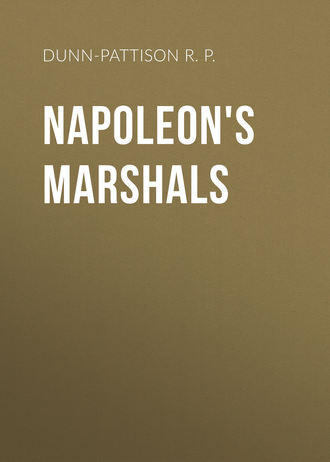 полная версия
полная версияNapoleon's Marshals
Poniatowski's campaign against Austria, glorious as it was for the Poles, was in reality the forerunner of disaster. During the campaign the Polish troops were supported by a Russian division. To Poniatowski, the Russians, the despoilers of his country, were more hateful than the enemy, and he so distrusted them that, at the risk of having to fight them, he refused to allow them to occupy any of the captured fortresses; this suspicion was increased by the capture of a secret despatch from the Russian commander to the Austrian Archduke, congratulating him on the victory of Razyn, and expressing a wish that his standards might soon be joined to the Austrian eagles. The Prince at once sent the intercepted despatch to Napoleon, who summed up the situation with the words, "I see that after all I must make war on Alexander." So when the Grand Army assembled for the invasion of Russia, Prince Poniatowski with his Poles rejoiced at the call to arms, and brought thirty-six thousand well disciplined and well equipped troops to the rendezvous, while sixty-five thousand were left to garrison the fortresses: the years of peace had been spent by him in busy labour as Minister of War, providing for the necessities of the army, establishing engineering and artillery colleges, equipping hospitals and perfecting organisation and discipline. Smolensk, Moskowa, and many a skirmish proved that the labour of organisation had not sapped Prince Joseph's dash and courage, and the horrors of the retreat brought out to the full his chivalrous bravery and determination. Though wounded during the retreat, he was ready the following year to help the French in Central Europe. On the morning of the first day of the battle of Leipzig, Napoleon, to fire the Poles, sent their Prince his bâton as Marshal. While esteeming the honour, Prince Joseph showed no undue elation, for, much as he admired the French, and grateful as he felt, he was at heart a Pole, and, as he said to a comrade, "I am proud to be the leader of the Poles. When one has a unique title superior to that of Marshal, the title of Generalissimo of the Poles, nothing else matters. Besides, I am going to die, and I prefer to die as a Polish general and not as a Marshal of France." But the Marshal did not allow his gloomy forebodings to interfere with his duty, and so fiercely did he face the enemy that after three days' fighting his corps had dwindled from seven thousand to a bare two thousand men. On the morning of the fatal 19th of October the Emperor sent for him and entrusted him with the defence of the southern suburb of Leipzig. "Sire," said the Prince, "I have but few followers left." "What then?" rejoined the Emperor; "you will defend it with what you have." "Ah, Sire," replied the Prince Marshal, "we are all ready to die for your Majesty." Thus spoke the Pole, but many a Frenchman thought otherwise and hurried from the stricken field. With their hated enemies, the Austrians, Russians and Prussians surrounding them, the small band of devoted Poles fought to the last. When the bridge was blown up and ordered retreat was impossible, the Prince, drawing his sword, called out to those around him, "Gentlemen, we must die with honour." Severely wounded, with a handful of followers, he fought his way through a column of the enemy and reached the bank of the Elster. Faint from loss of blood, he urged his horse into the stream, and by great exertions reached the other side; but the beast, worn out by the long days of battle, was unable to clamber up the steep, slippery bank, and the Prince Marshal was so faint that he could no longer guide his steed; so horse and rider dropped back into the stream and were seen no more alive. Two days later his body was recovered, and buried with all the honours due to his rank, in the presence of the allied sovereigns, his former enemies. Thus passed away Prince Joseph Poniatowski, whose chivalrous courage had won for him the title of the Polish Bayard, whose life had been spent for the welfare of his country, whose high military reputation was sullied by no inglorious act, and who at the last chose death rather than surrender.

